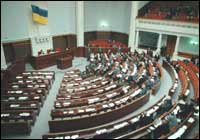Orange Meltdown on the Dnepr
 It looks like we are now seeing the final meltdown of the old Orange Coalition in Ukraine.
It looks like we are now seeing the final meltdown of the old Orange Coalition in Ukraine. Since the parliamentary elections in March there have been attempts to overcome the divisions between President Yushenko’s pro-Western forces and the more populist inclinations of former Prime Minister Timoshenko.
And there was strong international backing for these efforts.
But it was all questionable from the beginning whether this would ever succeed. Personal animosities were running very high. And there were doubts whether Yulia Timoshenko – for all her charisma and personal ambition – would really be able to govern better a second time than her rather disastrous performance the first.
On Thursday the final attempt to forge together the coalition seems to have collapsed as an ally of the coalition crossed the line and had himself elected speaker of parliament with the help of the opposition parties.
News headlines are now proclaiming a new coalition in Ukraine composed of the Party of Regions – the strong force in Eastern Ukraine – the Socialists of newly elected speaker Moroz and the Communists.
That might be somewhat premature – but it’s certainly a political crisis of the first order.
There is likely to be discreet jubilation in the Kremlin and increasing worry in Washington and Brussels. You should not be surprised to see a smile of satisfaction on President Putin’s face as he approaches the G8 Summit in St Petersburg.
But all is certainly not lost on the Dnepr.
Now is really the time for a realistic and intense Western engagement with Ukraine that goes beyond romanticism for the old Orange Revolution.
That Orange coalition is no longer viable, but that does not need to mean that the reform course of the Ukraine is lost beyond repair. It certainly needs to be anchored more broadly in the political spectrum.
Here the European Union must be the main actor. Ukraine needs membership of the WTO and “deep free trade” with the European Union. It needs economic reforms – also in order to be able to pay the higher prices for the gas from Russia it is dependent upon.
Moves towards NATO might realistically have to be put on a slower path. The issue is too controversial and divisive in the country itself.
But for the time being we will have to watch how the continued constitutional crisis in Kiev plays out.
It would not surprise me if it ends up with a coalition between President Yushenko’s Our Ukraine and the Party of Regions. For the stability of the country that might not be the worst option on the table.


<< Home